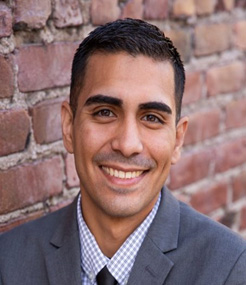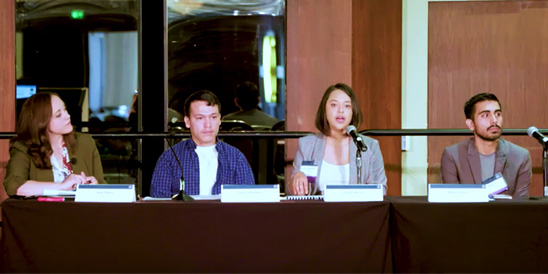 Miguel Garcia is a youth member of California’s state advisory group and a policy coordinator at the Anti-Recidivism Coalition in Los Angeles. Photo is courtesy of Impact Justice.
Miguel Garcia is a youth member of California’s state advisory group and a policy coordinator at the Anti-Recidivism Coalition in Los Angeles. Photo is courtesy of Impact Justice. As a youth member of California’s state advisory group, Miguel provides input on the allocation of OJJDP Title II formula grant funds to juvenile justice and delinquency prevention programs in the state. He is employed as a policy coordinator at the Anti-Recidivism Coalition in Los Angeles, a group that provides a support network and access to housing, jobs, and educational opportunities for people reentering their communities from secure confinement. The organization also involves young people and their families in advocating for improvements to the juvenile justice system.
In addition, Miguel is a member of the Youth Advisory Council for the Annie E. Casey Foundation’s Juvenile Justice Strategy Group and a consultant to Northwestern University, where he informs the development of new resources for transition-age youth.
He also trains young adults in the AmeriCorps program to serve as reentry “navigators” for people transitioning from corrections back into the community. In an April 2020 interview, Miguel stressed the importance of informing youth about California’s “honorable discharge” option, which seals their records and reduces barriers to education and employment once youth have successfully completed community supervision. This option became available with the passage of California Senate Bill 625 in 2017.
“This legislation made a difference in my own life,” Miguel said. “It’s now possible for me to become a practicing attorney in California.” Miguel plans to go to law school and continue his work in public policy and juvenile justice reform. In 2018, Miguel earned a bachelor’s degree in political science and international affairs from the University of California at Riverside. He also holds three associate degrees from Riverside Community College.
—Miguel Garcia
It has been a long and difficult road to this promising future. Miguel grew up in a rough area of Riverside County. His parents were divorced, and his father was not a consistent presence in his life. “The community was always in conflict,” Miguel said. “Many people were unemployed. You come into contact with youth who are either trying to rob someone or involved in gangs. You’re having to choose between surviving or not surviving.” As a teenager, he began hanging out with the wrong crowd, and in 2010 he was incarcerated on serious charges.
When he entered confinement, he underwent surgery for a broken clavicle, and inadequate medical supervision led to a serious infection. Later, he was involved in a violent disturbance that landed him in lockdown for several weeks. “I was let out for 1 hour a day. All I remember is my white shirt, my trunks, and the white bed sheet.” In addition, he worried about the burden that monthly court fees were placing on his mother. “If she did not pay,” he said, “she would have lost her driver’s license and been arrested. My mother used her savings. Many communities of color don’t have savings, and that’s not possible for them.”
 Miguel Garcia (shown on the right) participated in a youth panel discussion at OJJDP’s 2019 National Training Conference in Kansas City, MO.
Miguel Garcia (shown on the right) participated in a youth panel discussion at OJJDP’s 2019 National Training Conference in Kansas City, MO. Miguel’s life turned around when he joined an Alpha class for young men. Mentors taught leadership and communications skills and inspired him to begin planning a productive future. “Rosalinda [Rosalinda Vint, President of Women of Substance & Men of Honor] talked about formerly incarcerated young people out there doing fantastic things,” Miguel said. “I asked myself: How can I be part of that? I started to think about what my own dreams were, and what I could do to make them a reality.”
He began taking online college courses, joined vocational training programs, and worked on an inmate construction crew. The guard in charge of the construction project noticed Miguel’s performance, and asked him to supervise the 25 youth on the crew. “All of this positive information was reported by the parole agency, and it helped me get released,” Miguel said. “I went home with $5,000 I had earned for my work.”
After his release, Miguel lived with his uncle, away from his old neighborhood and its negative influences. While this was an improvement, he did not have access to reliable public transportation, and trips to his classes at Riverside Community College could take as long as 4 hours. The probation agency provided little information about community-based services or guidance in finding a job. Eventually, through his friendship with Ms. Vint and another mentor he met through the Alpha class, Miguel landed an internship with Jose Medina, a member of the California State Assembly. “That was my first real job when I came home. Everything kind of snowballed from there.”
To this day, Miguel is still in touch with many of his Alpha classmates. “They are my best friends,” he said. “They’ve all gone on to live fruitful lives.”
